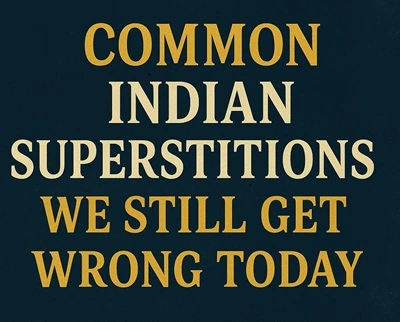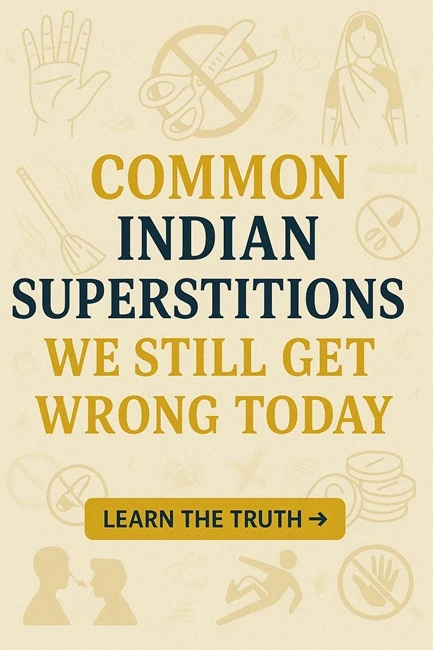“Shaam ko jhaadu nahi lagate.”
“Nakhun raat mein nahi kaatne chahiye.”
“Periods mein mandir aur kitchen mein jaana mana hai.”
If you’re an Indian, chances are you’ve heard at least one (or all) of these from your parents or grandparents. Passed down from generation to generation, these sayings became household rules paramparas we never questioned. But what if many of these so called traditions had entirely different roots? What if we’ve been blindly following rules that made sense hundreds of years ago, but are now just outdated?
Let’s take a trip back into the history behind some of these age old Indian family sayings, beliefs, and trends that started with good intent but lost meaning along the way and, more importantly, why it’s time to re-evaluate them.

Common Indian Superstitions and Beliefs Are:
1. “Shaam ko jhaadu mat lagao, Laxmi chali jaayegi.”
Literal belief: Sweeping the house in the evening drives away wealth.
Reality: It was about safety and practicality, not wealth.
In ancient times, homes didn’t have electricity. Sweeping in the evening could mean accidentally discarding small valuables like coins, jewelry, grains. So, the rule made sense then. But in today’s LED lit homes with vacuum cleaners and dustpans, is Laxmi really walking out the door with a jhaadu?
Yet, you’ll still hear a scolding voice at 7 PM: “Mat karo jhaadu! Kya kar rahi ho?”
It’s time to update the logic: cleanliness is next to godliness—regardless of time.
2. “Raat ko nakhun mat kaatna.”
Literal belief: Cutting nails at night brings bad luck or misfortune.
Reality: It was just to prevent injuries and losses.
Before tube lights and ceiling bulbs, trimming nails in dim light often caused cuts or lost nail clippings (which were considered unhygienic). Today, with modern grooming kits, nail cutters, and proper lighting, the risk doesn’t exist anymore.
Still, if you try cutting your nails at 10 PM, chances are someone in the house will say, “Kal subah kaat lena, abhi nahi.” Old habits die hard!
3. “Period mein ladkiya ‘apavitra’ hoti hain.”
Literal belief: Women during menstruation are impure and should stay away from temples, kitchens, and even other people.
Reality: It was intended as rest, not rejection.
Centuries ago, women were burdened with physical labor even during their menstrual cycle. The belief of ‘impurity’ was a camouflaged way of saying: take a break, sit this one out. But over generations, the message got twisted into social stigma and untouchability.
Even today, in many homes and villages, menstruating women are made to eat separately, sleep in different rooms, or skip religious ceremonies, completely sidelining the fact that periods are natural, not shameful.
This needs serious unlearning, especially in a modern India that’s talking about menstrual cups and workplace period leaves.
4. “Khaali doodh peena accha nahi hota.”
Literal belief: Drinking milk without anything (like sugar or food) brings bad luck.
Reality: It’s about digestive impact, not destiny.
Some believed that drinking milk without food would upset the stomach or cause acidity, especially on an empty stomach. So, to encourage people to pair it with something solid, the superstition angle was introduced. Over time, it morphed into a weird belief around bad luck.
In reality, plain milk can be quite healthy for many people. So, let’s drop the guilt tripping and stick to what suits our bodies best.
5. “Nimbu mirchi latka lo, buri nazar nahi lagegi.”
Literal belief: Hanging lemon and green chilies wards off evil spirits.
Reality: It was an old school natural pesticide.
Nimbu (lemon) and mirchi (chilies) hanging outside shops and autos was never about ghosts, it was actually a practical solution. The acidic lemon and pungent chilies acted as natural insect repellents. Especially in times when DDT and mosquito sprays didn’t exist.
But even today, a new shop inauguration is incomplete without a string of nimbu-mirchi swinging from the shutter. Kundali match ho ya na ho, nazar toh nahi lagni chahiye, right?
6. “Kaali billi raasta kaat gayi toh rukh jao.”
Literal belief: If a black cat crosses your path, it brings misfortune.
Reality: It was just about alerting someone to slow down.
In older times, spotting any animal suddenly crossing the path, especially in the dark was risky for people walking or on carts. The cat symbolized a break or pause before proceeding. Over time, it got color coded, and the poor kaali billi became a scapegoat for all bad luck.
In truth, no cat black, white, or tabby controls your destiny. They’re just adorable furballs living their own nine lives.
7. “Shaam ko paise dena ya udhaar dena mana hai.”
Belief: Lending or giving money in the evening leads to loss of wealth.
Origin: It was a bookkeeping practice, people preferred to close accounts before sundown to avoid confusion or disputes.
Why it’s outdated: Today’s financial transactions happen 24×7 via UPI, banks, and cards. Your money doesn’t vanish because of the sun setting!
8. “Matha mat dhona, jab kisi kaam pe ja rahe ho.”
Literal belief: Washing your head before an important task (like exams, job interviews, or travel) is inauspicious.
Reality: The belief came from concerns over head colds and fatigue.
Earlier, people bathed with cold water. Washing the head in early mornings before stepping out might cause illness or discomfort. So elders advised skipping hair washes before big days.
But today, with warm water, hair dryers, and climate control, this logic no longer applies. In fact, a refreshing shower often improves alertness and confidence, great before interviews or exams!
Still, many parents stop their kids with: “Kal paper hai, sir mat dhona!”
9. “Pehla joota hamesha maa-baap se lena chahiye.”
Literal belief: First shoes or slippers should be gifted by parents.
Reality: Purely sentimental, not spiritual.
This was a sweet way for parents to bless their child as they started walking or working. But it somehow evolved into a compulsory ritual. Now, some believe if your parents don’t buy your first shoes, your path in life will be rocky!
Let’s not weigh down parental love with guilt based rituals. If they gift it, beautiful and If not, you’re still walking fine, aren’t you?
10. “Nazar utaarna zaroori hai.”
Literal belief: People’s jealousy or evil gaze can bring harm.
Reality: Psychological comfort, not magic.
Using mirchi, nimbu, salt, or burning red chilies was believed to ward off the “evil eye.” While there’s no scientific backing, these rituals offer mental relief to those who believe. It’s symbolic way of saying, “I’m protecting you.”
While there’s no harm in continuing rituals that give comfort, let’s not use them to shame success or limit celebration, especially of women or children. Not everything is “nazar lag gayi” some things just happen.
How to Talk About These Common Indian Superstitions and Beliefs With Family
Breaking generational myths isn’t easy, especially when it comes from elders we deeply respect. But here are a few gentle ways to start:
- Ask “why” with curiosity, not confrontation.
- Share articles or videos that explain the science/history.
- Respect their belief but also assert your view calmly.
- Lead by example , question and reflect openly.
Remember: the goal isn’t to win an argument but to spark reflection.
Conclusion: Let’s Keep What’s Meaningful, Not What’s Misunderstood
Our cultural fabric is rich, layered, and beautiful. But like any living tradition, it must breathe, evolve, and grow. Let’s hold onto the values behind rituals, kindness, rest, hygiene, respect and let go of the fear, guilt, and blind spots.
After all, even our ancestors never meant for traditions to become cages. They meant them as guiding lights.
So, next time someone tells you, “Shaam ko jhaadu mat lagao!” smile and say, “Laxmi toh safai mein hi rehti hai, na?”
FAQs – Common Indian superstitions and beliefs
Q. Is it really unlucky to sweep at night?
Not at all! This belief came from the fear of losing small items in dim light. Clean whenever you like.
Q. Are periods impure according to Indian scriptures?
No. Periods are natural. Ancient rules were meant to offer women rest, not shame them.
Q. Is there science behind black cats being unlucky?
No scientific proof. It’s a social superstition with no real logic.
Q. Can I cut nails at night now?
Yes. With proper lighting and tools, there’s absolutely no harm.
Q. Are all old beliefs wrong?
Not at all. Many were practical or protective. The key is to understand their original context.
For more such Interesting and Entertaining Information, Follow Popnewsblend.com

Hi, I’m Prashant Jain — a curious soul, storyteller, and content creator at heart.I’ve always been drawn to the world of entertainment, travel, sports, health & lifestyle — not just as a writer, but as someone who genuinely lives these experiences. Whether I’m binge-watching the latest OTT series, exploring offbeat spiritual destinations in India, or diving deep into wellness routines and cricket match insights, I love sharing what I discover with like-minded readers.
PopNewsBlend is my way of blending personal journeys with meaningful stories — ones that inform, inspire, and keep you ahead of the curve. Everything I write comes from real observations, hands-on experiences, and a deep passion for understanding the world around us.
Discover more from Popnewsblend
Subscribe to get the latest posts sent to your email.







